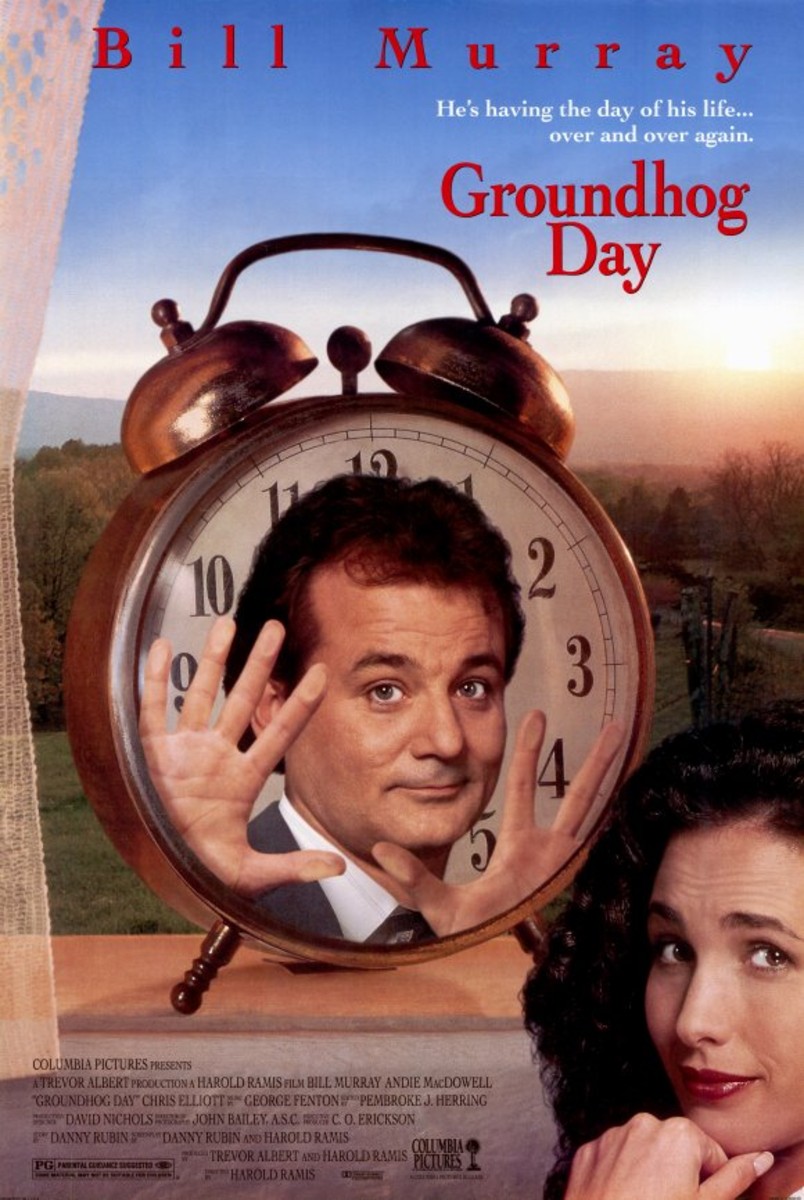Film and the Tyranny of the Repeating Day: Edge of Tomorrow and Groundhog Day
By Bernie Langs

“Carpe Diem” or “Seize the Day” is the banal, clichéd rallying war cry that commencement speakers send off the graduating classes of universities into the world. Yet once in the rhythm of the work day, we very quickly learn that it is the day that seizes us, with its unvarying and very precise routines. In truth, college too is broadly scheduled, and I’m reminded of a school pal who would meet me in the cafeteria and while dressing his lunch would glumly announce “12:16, time to put the ketchup on my hamburger” for weeks on end. I now marvel that as I leave work, I turn a street corner and see local construction workers descending a ladder each day, and within four minutes, the same two women will pass me by on the street. It’s like clockwork.
Civilization’s intellect and spirituality can be said to have been based on relentless repetition and what that meant in the past for everything from growing of crops to preparing for bitter cold or sweltering heat. Early religions responded with homage to these cycles and Nature for its seasonal brutalities which they would try to appease by offerings of sacrifices and wine, the fluid of life.
As inevitable as the characteristics of the four seasons, our daily routines can be unvarying for years and years. In the brilliant film “Groundhog Day”, directed by Harold Ramis and starring the comically sublime Bill Murray, an acerbic, sarcastic, basically miserable weatherman becomes subject to living February 2nd over and over again. Each day he wakes up in Punxsutawney, Pennsylvania to cover the quaint local Groundhog Day ceremony with its famous ritual of pulling a groundhog from a cage to determine the length of the remaining winter. The movie is often hilarious, but many deeper meanings and philosophical undertones slowly reveal a struggle by its protagonist that can resonate with all of us.
 At first, Bill Murry will go to any lengths to escape waking up again to the sound of his clock radio playing Sonny and Cher’s “I Got You Babe” accompanied by the inane banter of local disc jockeys, as the viewer ponders his own morning routines. Murray even goes to the extreme of a multitude of ludicrously planned suicides to escape his woe. There is an eventual epiphany, beautifully beginning with Bill Murray reading a book in the local diner and just looking up to marvel at his surroundings.
At first, Bill Murry will go to any lengths to escape waking up again to the sound of his clock radio playing Sonny and Cher’s “I Got You Babe” accompanied by the inane banter of local disc jockeys, as the viewer ponders his own morning routines. Murray even goes to the extreme of a multitude of ludicrously planned suicides to escape his woe. There is an eventual epiphany, beautifully beginning with Bill Murray reading a book in the local diner and just looking up to marvel at his surroundings.
In contrast, Tom Cruise, in the science fiction adventure “Edge of Tomorrow” directed by Doug Liman, faces a repeating day of violent death in a battle with an army of machine or insect-like aliens on a beach resembling the D-Day scene in Steven Spielberg’s “Saving Private Ryan.” Cruise’s character is trying from the get-go to escape his death and is taught that if he does win out, it will mean a victory for the armies of Earth against the aliens and the redemption of the whole world.
When “Edge of Tomorrow” was released in 2014, I laughed off any thought of seeing the movie, since in the promotions Cruise and his co-star the fabulous Emily Blunt bandy about in large, super-hero armor as they fight this computer-generated enemy. The film is currently available on cable movie channels and I’ve now watched it three times. Cruise’s mission to escape his repeating day sails far above any comic book notions. He and Blunt’s rugged determination to win this war is a tale of ferocious pursuit in the name of “The Good.”
So if Bill Murry and Tom Cruise, the latter who’s killing of a rare alien-type makes him the one whose life “resets the day”, battle a mind-numbing repeating theme in their lives, how can we fight back against our often tiring routines that roll around each day? As we grow older and time accelerates, how do we accept that we are still a prisoner of the seasons, which bring us such things as snow each year without mercy or the banal jingles time and time again at Christmas season? After laughing off “Seize the Day” how do we regroup and actually grab life by the throat?
While I was at college, I took an introductory course in philosophy where one of our first assignments was to muse on an essay by Schopenhauer that asked that if we had a chance to do an action again in life, would we be able to do it differently. The argument being that since all the forces that bring us to the moment would repeat, we too would have no choice but to repeat our action, that our response is completely set. I recall noting that in the end of Schopenhauer’s study, he gets into the eternity of a moment in time and if there is truly a concept of “free will” we would not be bound by the repeating parameters, but could choose a different path and response within a moment that is essentially “timeless.”
I believe that one must seek the adventure in life, that we must pursue what is extraordinary within the shackles and constraints of numbing routine. Adventure is what you choose to find and rather than deferring to the constraint of Shakespeare’s idea that all the worlds’ a stage and people we see are its players, it is more an elaborate chess game set on a Cartesian grid, where although there are many factors in individuals, places and events, we are still free to move our pieces and if not gain a difficult win, play to an extremely satisfying “draw.”
Perhaps some invisible Creator did set this cyclical world in motion, and the last thing He/She/It (or whatever it is) did was to give the creatures that would eventually be shaped in the system the power of free will before, like Elvis, it “left the building” and moved on. We still own the power to “reset the day” and it is our responsibility to run with it and rise to the occasion as the heroes and heroines of our own stories.
Each morning as I approach my train station and I see the same people, standing in the very same spots they have stood every day for months on end, I’m tempted to smile and ask one of them “Going to see the groundhog?”
